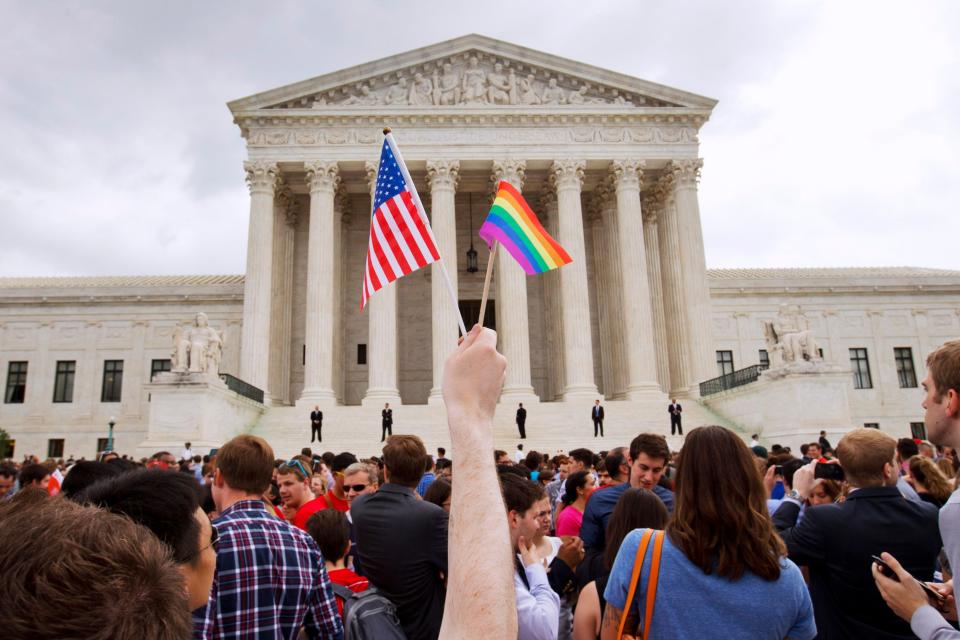Tennessee senators, religious leaders oppose marriage act over religious liberty concerns
A final Senate vote on Tuesday for a bill enshrining same-sex marriage rights poses a major threat to religious liberty, contend members of Tennessee’s congressional delegation and influential religious leaders in the state.
The Senate approved the Respect for Marriage Act in a bipartisan 61-36 vote. The legislation now goes back to the House for final passage before heading to President Biden’s desk. The bill would repeal a decades-old federal law defining marriage as between one man and one woman.
Tennessee's two U.S. senators, Republicans Marsha Blackburn and Bill Hagerty, voted against the bill, saying the version that passed fails to adequately protect the religious freedoms of Tennesseans.
Ahead of Tuesday’s vote, Blackburn and the Nashville-based Ethics and Religious Liberty Commission, the lobbying arm of the Southern Baptist Convention, endorsed attempts to strengthen protections for religious institutions that hold traditional views of marriage.
The bill "raises legitimate concerns for people of faith," ERLC President Brent Leatherwood said in a statement Tuesday after the vote. "While new challenges may arise because of this, the task before believers remains the same: Articulate and embody a Christian vision for a culture awash in confusion about marriage."

The ERLC, seen as speaking on behalf of nearly 14 million Southern Baptists nationwide, campaigned against the bill, while also calling for modifications to it should it pass.
Related:Senate passes landmark legislation protecting same-sex marriage rights: recap
The legislation initially arose out of concerns about same-sex marriage rights, which were established by the 2015 U.S. Supreme Court case Obergefell v. Hodges, following the court's decision in June to overturn Roe v. Wade.
In a statement, Hagerty said the U.S. Supreme Court had "already ordered what this bill seeks to accomplish."
"Rather, it provides new avenues to exploit for litigation and government enforcement actions against Americans for genuinely-held religious beliefs in the traditional definition of marriage," Hagerty said.
He said the bill fails to adequately protect religious liberty.
Likewise, a Blackburn spokesperson said, "It is unfortunate that the Senate could not agree on any of the measures that would help protect religious freedom for Tennesseans."
On Tuesday, before the Senate’s vote for final approval, U.S. Sens. Mike Lee, R-Utah, James Lankford, R-Oklahoma, and Marco Rubio, R-Florida, proposed three amendments strengthening protections for religious institutions. All three amendments failed.
Lee's proposed amendment sought to shield religious institutions from “legal harassment or retaliation from the federal government for holding sincerely held religious beliefs or moral convictions,” Lee said in a letter, which Blackburn cosigned.
Still, some religious groups, including conservative denominations, acknowledged the bill contained some protections for religious liberty. Most notably, The Church of Jesus Christ of Latter-day Saints voiced its support for the bill earlier this month.
The Utah-based church has 17 million members and in a statement this month said that church doctrine would continue to consider same-sex relationships to be against God's commandments. But the church said it would support the rights of same-sex couples as long as they didn't infringe on the rights of religious groups.
In addition to the LDS church, U.S. Sen. Susan Collins, R-Maine, said the churches and faith-based groups backing the religious liberty protections in the bill included the Seventh-day Adventist Church, the National Association of Evangelicals, and the Union of Orthodox Jewish congregations.
Others hailed the passage of the landmark bill.
“Our community really needs a win, we have been through a lot," Kelley Robinson, the incoming president of Human Rights Campaign, which advocates on LGBTQ issues, told the Associated Press. “As a queer person who is married, I feel a sense of relief right now. I know my family is safe.”
USA Today and the Associated Press contributed to this report.
Liam Adams covers religion for The Tennessean. Reach him at ladams@tennessean.com or on Twitter @liamsadams.
This article originally appeared on Nashville Tennessean: Tennessee Sens. Marsha Blackburn, Bill Hagerty vote no on marriage bill

